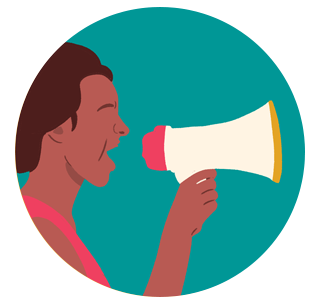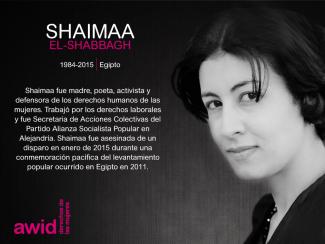
Shaimaa El-Shabbagh

Le Conseil des droits de l'homme (CDH) est un organe intergouvernemental clé du système des Nations Unies, responsable de la promotion et la protection des droits humains autour du globe. Il se réunit trois fois par an en session ordinaire, en Mars, Juin et Septembre. Le Bureau du Haut-Commissariat des Nations Unies aux Droits de l’Homme (HCDH) constitue le secrétariat pour le CDH.
Débat et adopte des résolutions sur les questions globales des droits humains ainsi que sur la situation des droits humains dans des pays particuliers
Examine les plaintes des victimes de violations des droits humains et des organisations activistes, au nom des victimes de violations des droits humains
Nomme des experts indépendants (que l'on connaît sous le nom de « Procédures Spéciales ») pour réviser les cas de violation des droits humains dans des pays spécifiques, ainsi que pour examiner et suivre des questions globales relatives aux droits humains
Prend part à des discussions avec les experts et les gouvernements sur les questions de droits humains
Évalue les bilans des États membres de l'ONU en matière de droits humains tous les quatre ans et demi, dans le cadre de l'examen périodique universel.
La prochaine session du CDH a lieu à Genève, en Suisse, du 30 juin au 17 juillet 2020.
AWID travaille avec des partenaires féministes, progressistes et du domaine des droits humains pour partager nos connaissances clé, convoquer dialogues et évènements avec la société civile, et influencer les négociations et les résultats de la session.
Creemos que para que los movimientos feministas sean transformadores y sólidos debemos seguir trabajando en nuestras similitudes y diferencias. También debemos cuestionar el poder y los privilegios, tanto dentro como fuera de nuestros movimientos.

É claro que sim. As suas respostas serão eliminadas no final do processamento e da análise dos dados, e só serão usadas para fins de investigação. Os dados NUNCA serão divulgados fora da AWID e serão processados apenas por colaboradores e consultores da AWID que trabalham no projeto WITM connosco. Damos prioridade à sua privacidade e ao seu anonimato. Consulte a nossa política de privacidade detalhada aqui.
Connue comme la drag queen de couleur de New York, Sylvia était une infatigable et féroce défenseure des marginalisé·e·s et exclu·e·s au début des années 1970, alors que le mouvement pour les « droits des gays » prenait de l’ampleur aux États-Unis.
Dans un discours bien connu prononcé pour Chistopher Street Day en 1973, Sylvia s’est exclamée, parmi une foule de membres de la communauté LGBT :
« Vous me dites tous d’aller me cacher, la queue entre les jambes.
Je ne supporterai plus ces conneries.
On m’a battue.
On m’a cassé le nez.
On m’a jetée en prison.
J’ai perdu mon travail.
J’ai perdu mon appartement.
Tout ça pour la libération gay, et vous me traitez de la sorte?
C’est quoi votre putain de problème à tous?
Réfléchissez à ça! »
En 1969, à l’âge de 17 ans, Sylvia a participé aux célèbres émeutes de Stonewall en jetant, paraît-il, le deuxième cocktail molotov en signe de protestation contre la descente de la police dans le bar gay de Manhattan. Elle a continué à être une figure centrale des soulèvements qui ont suivi, organisant des rassemblements et ripostant aux brutalités policières.
En 1970, Sylvia a collaboré avec Marsha P. Johnson à la création de Street Transvestite Action Revolutionaries (S.T.A.R.), collectif et organisation politique qui mettait sur pied des projets de soutien mutuel pour les personnes trans vivant dans la rue, celles et ceux aux prises avec la toxicomanie ou en détention, et spécialement pour les personnes trans de couleur et celles et ceux vivant dans la pauvreté.
Refusant les étiquettes, Sylvia a incité les personnes du mouvement de libération gay à penser différemment, et ce, tout au long de sa vie. Elle a déclaré :
« J’ai quitté ma maison en 1961, à l’âge de 10 ans. Je me suis démenée sur la 42e rue. Le début des années 1960 n’était pas génial pour les drag queens, les garçons efféminés ou les garçons qui se maquillaient comme on le faisait. À l’époque, on se faisait battre par la police, par tout le monde. Je n’ai pas vraiment fait mon coming out en tant que drag queen avant la fin des années 1960. C’était vraiment la débandade lorsque des drag queens se faisaient arrêter. Je me rappelle la première fois où je me suis fait arrêter, je n’étais même pas habillée entièrement en drag. Je marchais dans la rue et les flics m’ont tout simplement attrapée. Les gens maintenant prétendent que je suis une lesbienne, parce que je suis avec Julia, ce à quoi je leur je réponds : « Non, je suis juste moi. Je ne suis pas une lesbienne. » J’en ai marre d’être étiquetée. Je ne suis même pas en faveur de l’étiquette de transgenre. J’en ai marre de vivre avec des étiquettes. Je veux juste être qui je suis. Je suis Sylvia Rivera »
Par son activisme et son courage, Sylvia Rivera a présenté un miroir où se reflétait tout ce qui n’allait pas dans la société, mais aussi la possibilité d’une transformation. Sylvia est née en 1951 et décédée en 2002.
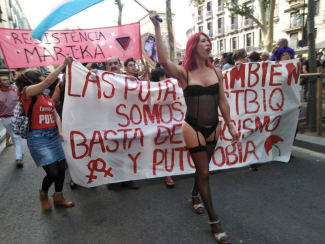
por Esra Ozban
En un mundo obsesionado con los productos, el proceso de priorización es un método feminista fundamental. Los procesos importan, y la curaduría no es una excepción. Mientras trataba de determinar cuáles de las películas de la región del Sudoeste Asiático y África del Norte (SWANA, por su sigla en inglés) serían más relevantes para el tema de las realidades feministas, la pandemia global, que todavía estamos enfrentando, modificó tremendamente nuestras vidas cotidianas. Incluso pensar, escribir o expresarme se ha convertido en una lucha diaria. Se me pasaban constantemente las fechas límites, y mandaba correos de disculpas a Kamee Abrahamian, con quien estaba trabajando como curadora independiente para el proyecto de la Club de Cine Feminista de AWID. El invalorable apoyo de Kamee, su comprensión y sus sugerencias, me recordaron que, incluso en dos lugares diferentes del mundo, como colegas que nunca se han encontrado personalmente, podemos crear conjuntamente micro versiones de las realidades feministas que anhelamos y para las cuales vivimos.
Para mí, las realidades feministas tienen mucho que ver con las sororidades. Sororidades que ayudan a lxs mujerxs que se ocupan de la remoción de minas en Artsaj/Alto Karabaj. Sororidades horneadas en Vegan Inclusive Trans Cake [Torta Trans Vegana Inclusiva] de feministas trans jóvenes de Ankara, que les recuerdan que no están siendo bienvenidas por la generación Z a las hermanas cis. Sororidades que están creciendo entre la menta de la azotea de Dragiča Alafandi, en el campamento de refugiadxs de Dheisheh de la Palestina ocupada, en Sowing seeds of resistance [Sembrando semillas de resistencia]. Sororidades que asumen proximidades íntimas, sexuales y revolucionarias en el Parque Gezi en #resistayol. Sororidades que sacan a la luz un encuentro imaginado entre dos generaciones de mujerxs exiliadxs en las calles de Haifa, en Your father was born 100 years old and so was the Nakba [Tu padre nació teniendo 100 años, igual que la Nakba]. Sororidades interespecies que se desarrollan en un espacio ficticio (y valiente) creado por Mounia Akl en Submarine [Submarino] para su personaje rebelde Hala, quien se rehúsa a ser evacuada de una ciudad llena de basura y es abandonada con su amigx perrx.
Esta selección reúne trozos y fragmentos de muchas realidades feministas que se han producido en la región del Sudoeste Asiático y África del Norte durante los últimos años. Continuaremos imaginando, aprendiendo y compartiendo corporizaciones feministas de esperanza y poder. Mientras tanto, sumerjámonos en las potentes alternativas a las que lxs cineastas y lxs protagonistas de estas películas han dado vida. Podemos crear conjuntamente cada paso, cada acto y cada intento, mientras seguimos cohabitando este mundo con otrxs que están viviendo realidades feministas y que persisten en sus sueños para dar vida a más de estas realidades.
por Emily Mkrtichian y Jesse Soursourian
«Con una belleza visual y atractivas escenas de la realidad, Motherland es un espectáculo de camaradería y fortaleza femeninas... La película es un testimonio de mujeres de todo el mundo que están dispuestas a trabajar más aún, para superar cualquier obstáculo que encuentren.»
- Nosarieme Garrick, cineasta galardonada
«Motherland es una inspiradora visualización de solidaridad, valentía, y agallas...»
- Hers is Ours Collective, organizadorxs del Outsider Moving Art & Film Festival
Motherland from jesse soursourian on Vimeo.
Emily Mkrtichian sobre las realidades feministas y Artsaj/Alto Karabaj
Filmamos el cortometraje Motherland en la República de Artsaj en 2018. Cada una de estas mujeres me atrajo por su fortaleza, su resiliencia y su humor, a pesar del contexto en el que vivían. En 2018, ese contexto era el del período posterior a una guerra brutal que había tenido lugar en la década de 1990, después de la cual su país se convirtió en un territorio no reconocido (o disputado, para la comunidad internacional) que no recibía la autonomía y la independencia de las que gozan tantos otros países. Artsaj estaba también profundamente afectada por las consecuencias que vemos en casi todos los lugares que atraviesan conflictos violentos, -consecuencias que tan a menudo recaen sobre las mujeres-: trastornos de estrés postraumático, altas tasas de alcoholismo, altas tasas de violencia doméstica, menos igualdades y libertades otorgadas a las mujeres, poca o ninguna representación de las mujeres en la política y la administración pública. Frente a estos desafíos, esta película trata de captar el fuego y el poder de las mujeres de Artsaj, algo que podría no ajustarse al paradigma feminista occidental tradicional, pero que ha sido creado por y para ellas mismas a través de los profundos lazos comunitarios, el cuidado de sus familias, el trabajo duro, y la capacidad de reírse juntas a lo largo de todo este proceso. Hoy, la República de Artsaj ha sido devastada nuevamente por otra guerra, que la dejó sin el 70% de las tierras que estas mujeres consideraron como propias durante toda sus vidas. Sin embargo, puedo prometerles que estas mujeres, y miles de otras, continúan sosteniendo a sus familias, sus comunidades y su cultura a través de las mismas redes de cuidado, del mismo compromiso con el trabajo duro y de las mismas carcajadas revoltosas, de cara a un futuro incierto.
por Baladi-Rooted Resistance
«Una película oportuna para mirar después de ser testigxs del último bombardeo de Gaza por parte de las Fuerzas de Defensa de Israel. Una mirada sobre el modo en que las mujeres de las comunidades palestinas sobreviven a la opresión estructural, a través de la historia de un banco de semillas tradicionales... y de las mujeres que lo sostienen como forma de alimentar la rebelión.»
- Jessica Horn, activista feminista panafricana, escritora y co-creadora del sitio web the temple of her skin
«Ver mujeres que se reúnen y trabajan colectivamente por la autonomía alimentaria es, para mí, terapéutico y empoderante.»
- Hers is Ours Collective, organizadorxs del Outsider Moving Art & Film Festival
Equipo Baladi-Rooted Resistance sobre las realidades feministas«¿Cómo hablar sobre realidades feministas cuando vives en Deheisheh, un campamento de refugiadxs palestino, construido hace setenta años para contener a tres mil refugiadxs, pero que es ahora el hogar de quince mil personas, en la Cisjordania ocupada? ¿O cuando la tierra que cultivas está amenazada constantemente por los colonizadores ilegales?
Si eres mujer en Palestina ocupada, tienes que luchar no solo contra el patriarcado, sino también contra el colonialismo y contra una ocupación militar brutal.
Dragiča y Vivien están peleando contra estos múltiples sistemas de dominación, a su propio modo.
Vivien utiliza semillas nativas para ayudar a lxs palestinxs a mantener su identidad. Cultivar alimentos tradicionales de forma tradicional es sumamente significativo: «Si ya no eres unx productorx, eres unx consumidorx, y qué mejor manera de esclavizar a alguien que convertirlx en tu consumidxr . Esto está sucediendo en todo el mundo, pero aquí se duplica con la ocupación militar.»
El 31,5% de los hogares de Cisjordania no tiene seguridad alimentaria. Mediante un huerto de azotea, Dragiča logró incrementar la autonomía alimentaria de su familia. En el hacinado campamento, al que el ejército israelí realiza incursiones nocturnas de forma regular para arrestar y acosar a lxs residentes, el huerto de azotea de Dragiča no solamente nutre a su familia, sino que, en especial, nutre su alma.»
por Ruzgar Buski
Ruzgar Buski sobre las realidades feministas
«No sé qué decir sobre las realidades feministas, pero, como artista trans, como activista de Turquía, sé que nuestras realidades son duras. Vivimos con violencias: ¡físicas, emocionales, económicas, sexuales!. Por eso es que tenemos que construir nuestras propias redes, y crear conjuntamente microrrealidades recíprocas es, para mí, una realidad feminista. #resistayol es mi primera película, y al comienzo planeaba hacer una película por/para/con personas trans que no tratara de convencer a nadie del hecho de que las personas trans son humanas, ni que se centrara en crear consciencia sobre los temas trans. Sin embargo, sucedieron las protestas del Parque Gezi, que se convirtieron en una de las sublevaciones más grandes de la historia de Turquía, y la película resultó ser algo diferente.
Creo que el proceso de producción afecta realmente lo que la película termina siendo. Nos esforzamos mucho para que trabajaran mujeres y personas trans y no binarias en cada etapa de la filmación. Esta película está hecha por gente que se reunió con camaradería y amistad. Kanka Productions está basada en el compañerismo transfeminista. Quiero que la película aporte esperanza, que sane, porque acarreamos muchos traumas en nuestros cuerpos: esto es lo que nos constituye y lo que nos conecta. La sanación es un proceso que nunca termina, y tenemos que crear espacios para respirar. #resistayol es una hora de respiración colectiva.»
Boysan Yakar en #resistayol
«Bueno, lxs lubunyas (queers) estábamos sentadxs en el parque, y de pronto llegaron topadoras y todxs nos enojamos. En realidad, en resumen, eso fue suficiente . Es el parque de lxs lubunyas, y teníamos treinta días para explicar eso a esta ciudad enorme. Todxs reconocen que a la noche los ibnes (putos) cogen en ese parque... El bloque LGBTI llevó a nuestra comunidad ahí. Ya no confiábamos en el Estado s y la policía, y no teníamos seguridad; hemos establecido nuestras propias formas de hacer las cosas, nuestras propias leyes y costumbres para sobrevivir... Rápidamente, llevamos nuestra ley a Gezi. En un esfuerzo por establecer un lenguaje y un entendimiento comunes entre todos estos grupos, el lenguaje LGBT de unión y solidaridad se propagó por todo el parque. Todos los días había una Marcha del Orgullo, todxs decían continuamente “ayol”. Embellecimos el lenguaje apestoso y polvoriento de la izquierda. Supongo que tuvimos este nivel de impacto porque hemos sido repudiadxs todos estos años. Desde lxs más radicales hasta lxs más conservadorxs y nacionalistas, todxs nos necesitaban, porque todxs nos habituamos a ser confrontadxs por todo. Ellxs no estaban acostumbradxs a tanta energía, a nuestra energía. Por eso esta fue una gran arena política para nosotrxs. Todos los días hacíamos realidad aquí nuestra mayor y principal lucha, o sea, una lucha por la visibilidad y el reconocimiento. Por eso dejamos Gezi con una gran victoria.»
por Pembe Hayat
«... un manifiesto multifacético que muestra la alegría que existe en las amistades dentro de la comunidad queer de Turquía, como despliegues de rebelión y resistencia.»
- Nosarieme Garrick, cineasta galardonada
«... diversión, luz, y azar. En un mundo constantemente marcado por las cicatrices de la violencia contra la comunidad trans, nada, ninguna acción, está (desafortunadamente) privada de significado. De modo que ¡por más alegría, más amor, y más azar significativo!»
- Hers is Ours Collective, organizadorxs del Outsider Moving Art & Film Festival
Cayan Azadi en Vegan Inclusive Trans Cake
«Hola Barbies, Kens, muñecas de porcelana, Olivia Olivo, muñecas Pimpollo. Novias de Chucky, hermanas de Chucky, cuñados de Chucky y, por último pero no menos importante, estimados amantes de los cuñados.
Entonces, por qué hicimos esta torta.
Ahora recibimos la noticia de que una trabajadora sexual trans ha intentado suicidarse debido a la violencia de los vigilantes y la policía en las calles. En este momento, está siendo retenida en un puesto de policía y es exactamente por eso que hicimos esta torta. Esta torta travesti es horneada para mostrar que existimos en todas las partes de la vida, que existimos persistentemente, y esta torta muestra que no seremos erradicadas o ignoradas en esta sociedad.
Sí, hay violencia en nuestras vidas y sí, también hay mucha falta de respeto [shade], pero a pesar de todo eso igual podemos divertirnos, disfrutando de la vida todo lo que podemos. ¡Buen provecho, hermana!»
por Razan AlSalah
por Mounia Akl
«Este film está dirigido como se escribe un poema: es simple, un poco abstracto, y conmovedor.»
- Hers is Ours Collective, organizadorxs del Outsider Moving Art & Film Festival
Esra Ozban:
Esra Ozban es unx programadorx y cineasta turcx. Su trabajo artístico, curatorial y académico se cruza con las prácticas críticas de archivo, el trabajo sexual, la pornografía y las culturas cinematográficas feministas/queer, entre otras.
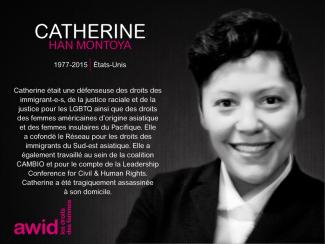
نهدف للوصول الى 2000 رد، وهذا تقريباً ضعف الردود التي جمعناها من استطلاع "أين المال" الأخير عام 2021.
Yamile Guerra was a well-known lawyer, community leader and political activist in the Santander region of Colombia.
She was actively working to resolve disputes between local communities and developers, advocating against illegal land appropriation. Yamile had occupied various political posts, including as the Secretary General for the Santander government in Bogota and also aspired for the Mayor’s Office of Bucaramanga. In the last few years of her life, Yamile became increasingly active in environmental causes, particularly in the defense of the biodiverse wetlands of Santurbán against development, a region which supplies nearly 2 million people with freshwater.
According to her family and friends, Yamile received daily threats against her life and had asked the authorities for protection.
“She was very very aware of this issue [land litigation] and she said many times that she felt insecure.” - Alixon Navarro Munoz, journalist and friend of Guerra family
On July 20, 2019 Yamile was shot to death by two men in Floridablanca, Santander. She had just finished discussing a land dispute with them. A suspect was later arrested for her murder and admitted to being paid to carry out her assassination. According to reports, Yamile was the third member of her family to have been killed in relation to land disputes. Her father, Hernando Guerra was murdered several years previously.
Yamile’s assassination is part of a wave of violence and systematic killing of hundreds of social activists and human rights defenders in Colombia. According to the Institute for Development and Peace Studies (INDEPAZ), at the time of Yamile’s death, over 700 community leaders and human rights activists had been killed since the country signed a peace agreement in August 2016. Most were murdered for confronting illegal drug trafficking and mining operations, with indigenous people, Afro-Colombians and women human rights defenders being most at risk.
Less than a week after Yamile’s death, thousands of Colombians marched all over towns and cities, holding up black and white photos of activists who had been killed, with signs that read: "Without leaders there can be no peace" and "No more bloodshed”.
Yamile Guerra was only 42 years old at the time of her assassination.

Linda Porn is yet another heroine of feminist union organizing and sex worker activism nationally (in Spain) and transnationally.
Originally from Mexico, she has been living in Spain since the 2000s. She is a sex worker, an activist, a single mother and a multidisciplinary artist. Drawing from these different identities, she uses performance, video art and theater to vizibilize struggles at the intersections of transfeminism, sex work, migration, colonialism and motherhood.
She combines art and sex work while caring for her daughter as a single mother.
Linda also belongs to sex workers collectives that fight for their rights, such as the OTRAS union and CATS Murcia. She also co-founded the group 'Madrecitas' - that visibilises and denounces racist institutional violence against migrant families. Violence to which she and her daughter were subjected as a sex worker and migrant single mother.
You can follow her art work here.
Les discours antidroits continuent à évoluer. Outre le recours à des arguments religieux, culturels et traditionnels, les acteur·rice·s antidroits s’approprient le langage de la justice sociale et des droits humains pour travestir leurs véritables programmes et gagner ainsi en légitimité.

Il y a trente ans, un télévangéliste américain candidat républicain décrivait le féminisme comme « un mouvement politique antifamille qui encourage les femmes à quitter leur mari, tuer leurs enfants, pratiquer la sorcellerie, détruire le capitalisme et devenir lesbiennes ». Cette idée progresse et acquiert aujourd’hui une légitimité insoupçonnée sous les apparats de l’« idéologie du genre » – une espèce de croque-mitaine polyvalent créé par les antidroits dans le seul but de s’y opposer.
Un thème revient sans cesse dans leurs discours teintés d’« impérialisme culturel », de « colonisation idéologique », de « génocide prénatal » et d’appel à la « clause de conscience » : la prise de contrôle. Les antidroits s’approprient des questions d’intérêt légitime, qu’ils et elles déforment pour servir leurs programmes oppressifs.
The AWID Forum will be organized around 6 interconnected topics. These ‘anchors’ center feminist realities.
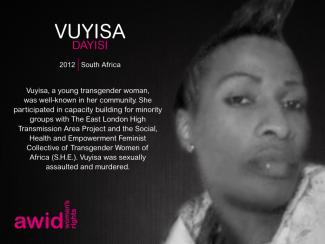
AWID Community is an online social networking platform for specifically for AWID members. It’s a feminist space for connection, resistance and celebration. A space for critical feminist conversations, collective power and solidarity. It is also a space for post-event dialogues, navigating difficult political learnings and community care
Binta Sarr fue una activista por la justicia social, económica, cultural y política, y una ingeniera hidráulica en Senegal. Después de 13 años en la administración pública, Binta dejó ese camino para trabajar con mujeres rurales y marginadas.
Fue de este compromiso que surgió la Association for the Advancement of Senegalese Women [Asociación para el Avance de las Mujeres Senegalesas] (APROFES, por sus siglas en inglés), un movimiento y organización de base que Binta fundó en 1987. Uno de sus principales enfoques fue la formación de dirigentes, en relación no solo con las actividades económicas, sino también con los derechos de las mujeres y el acceso a los puestos de toma de decisiones.
"Las poblaciones de base deben organizarse, movilizarse, asumir el control ciudadano y exigir la gobernabilidad democrática en todos los sectores del espacio público. La prioridad de los movimientos sociales debe ir más allá de la lucha contra la pobreza y debe centrarse en programas de desarrollo articulados y coherentes en consonancia con los principios de los derechos humanos, teniendo en cuenta al mismo tiempo sus necesidades y preocupaciones tanto a nivel nacional como subregional y desde una perspectiva de integración africana y mundial". - Binta Sarr
Partiendo de la convicción de Binta de que el cambio fundamental de la condición de la mujer requiere una transformación de las actitudes masculinas, APROFES adoptó un enfoque interdisciplinario, al utilizar la radio, los seminarios y el teatro popular, además de proporcionar una educación pública innovadora y brindar apoyo cultural a las acciones de sensibilización. Su compañía de teatro popular representó piezas originales sobre el sistema de castas en el Senegal, el alcoholismo y la violencia conyugal. Binta y su equipo también analizaron la conexión crucial entre la comunidad y el mundo en general.
"Para APROFES, se trata de estudiar y tener en cuenta las interacciones entre lo micro y lo macro, lo local y lo global y también, las diferentes facetas del desarrollo. Desde la esclavitud hasta la colonización, el neocolonialismo y la mercantilización del desarrollo humano, la mayor parte de los recursos de África y del Tercer Mundo (petróleo, oro, minerales y otros recursos naturales) están todavía bajo el control de carteles financieros y las otras multinacionales que dominan este mundo globalizado". - Binta Sarr
Binta fue una de las integrantes fundadoras de la sección femenina de la Asociación Cultural y Deportiva Magg Daan. Recibió distinciones del Gobernador Regional y del Ministro de Hidrología por su "devoción por la población rural".
Nacida en 1954 en Guiguineo, un pequeño pueblo rural, Binta falleció en septiembre de 2019.
"La pérdida es inconmensurable, el dolor es pesado y profundo, pero resistiremos para no llorar a Binta; no lloraremos a Binta, mantendremos la imagen de su amplia sonrisa en todas las circunstancias, para resistir e inspirarnos en ella, para mantener, consolidar y desarrollar su obra..." - Página de Facebook de Aprofes, 24 de septiembre de 2019.
"¡Adiós Binta! Creemos que tu inmenso legado será preservado." - Elimane FALL , presidente de ACS Magg-Daan
